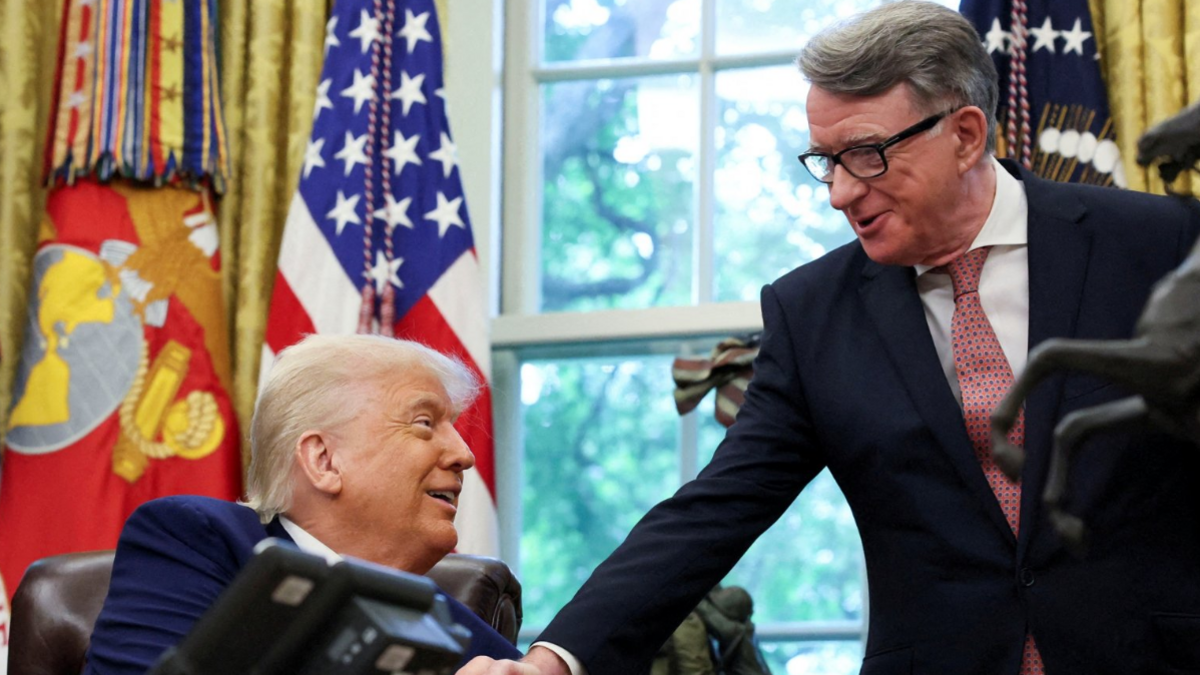Mandelson was not interviewed for US ambassador job

- Published
Civil service bosses have told MPs that Lord Mandelson, who was sacked as UK ambassador to the US due to close links with convicted paedophile Jeffrey Epstein, was never formally interviewed for the job.
The head of the civil service, Sir Chris Wormald, said there was no interview because Lord Mandelson was directly appointed to the role.
MPs heard that process meant Lord Mandelson was not directly asked about any conflict of interest with interviewers in person, but instead needed to fill in a form aimed more at potential financial conflicts.
Sir Chris said this process has been changed since Lord Mandelson's exit, to ensure a formal, minuted interview happens.
Lord Mandelson replaced career diplomat Dame Karen Pierce in Washington DC in December 2024, when Prime Minister Sir Keir Starmer decided he was the best candidate to build links with the newly-elected Trump administration.
Concern around Lord Mandelson's friendship with Epstein were raised at the time, but his ability to deal with President Trump, as well as his ability as a networker and seasoned political operator, was seen as a valuable asset.
That changed when emails were published showing Lord Mandelson sent supportive messages to Epstein as he faced charges for sex offences in 2008, which the government insisted was new information about the "depth" of the pair's relationship.
Sir Keir fired him in September, a day after having told MPs the Labour peer retained his "full confidence" at PMQs.
Ambassadors are managed by the Foreign Office and the civil service, and bosses of both were answering questions from MPs on the Foreign Affairs Committee.
Foreign Office head, Sir Oliver Robbins, was asked whether Lord Mandelson went through the normal process for appointing an ambassador and told MPs: "No, it was different because this was not run as a standard civil service process."
Labour MP Fleur Anderson asked whether Lord Mandelson's interview specifically included the opportunity to share "anything that could bring the government into disrepute".
Sir Chris said: "There was no interview for Mr Mandelson, it was done as a direct appointment by ministers, as Sir Oliver has described, and therefore there was no panel interview.
"That was the normal practice for direct ministerial appointments."
Changes have been made since Lord Mandelson's sacking, Sir Chris added, "so that we effectively replicate what would normally happen in a panel interview... where there is a minuted conversation with the candidate".
Sir Oliver said Lord Mandelson did complete a conflict of interest form, but when pressed on whether that included "friendships", he said: "No, it's not a sort of reputational conflict that's being targeted by that form, it's about reality of perception of economic or financial conflicts."
Starmer facing leadership questions after Mandelson sacking
- Published15 September
Tony Blair met Jeffrey Epstein while prime minister
- Published10 October
The two were also questioned on why Sir Keir appeared not to have been fully briefed about the seriousness of the new information by civil servants before defending Lord Mandelson at Prime Minister's Questions (PMQs).
Conservative MP Sir John Whittingdale set out how emails were sent to the Foreign Office by journalists at Bloomberg on Tuesday evening.
He said: "It must have been apparent to you before the prime minister got up at 12 o'clock on Wednesday that this was pretty explosive and did somebody not say to Number 10 'hold on, just before you express your complete confidence in Lord Mandelson there's something here you might like to be aware of'."
Defending the material being treated "sensitively and as a management issue", Sir Oliver said he needed to treat Lord Mandelson "as an employee to whom I owed a duty of care".
Sir John responded: "So you're saying to protect Lord Mandelson you gave no indication to Number 10 before PMQs that you had come across information which might cause serious doubt as to the appropriateness of his position?"
Lord Mandelson had not had a chance to respond to the Foreign Office about the "veracity and risks" around the emails ahead of PMQs, Sir Oliver said, adding "I had not personally spoken to the prime minister, no."

Sign up for our Politics Essential newsletter to read top political analysis, gain insight from across the UK and stay up to speed with the big moments. It'll be delivered straight to your inbox every weekday.